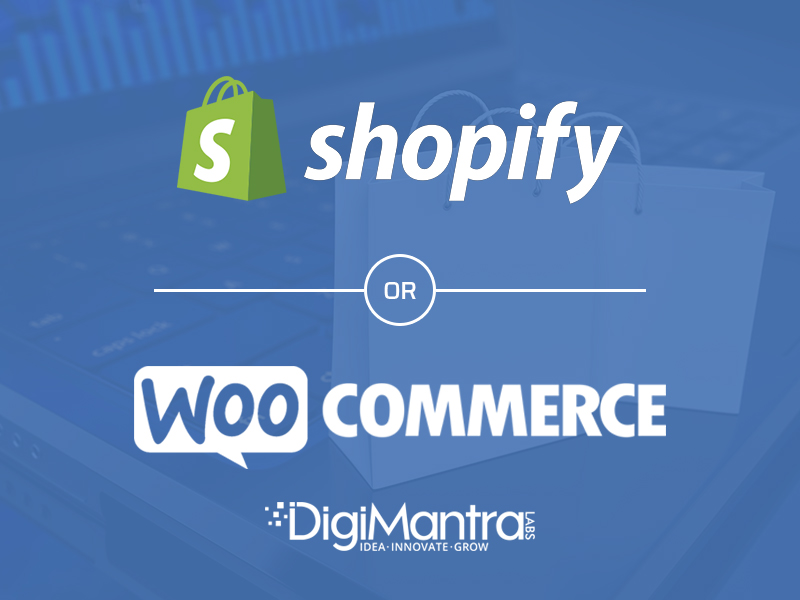WooCommerce Or Shopify – Which one is better for eCommerce development?

WooCommerce and Shopify both are great choices to starting up an online store to expand your business and increase profits. Both eCommerce platforms are great choices to serve different purposes and audiences. People love to shop from their comfort of their homes. Today’s e-commerce platforms make easy for users to buy and sell goods online. Each platform has its own advantages for specific circumstances. If you value flexibility and ownership – Woocommerce is the probably the best platform. If you value easy store management with simple options – Shopify is probably the one for you.
The range of eCommerce platforms promising for a great experience that makes it difficult for business owners to narrow down the options. Here we explore WooCommerce and Shopify.
1) Easy Installation
WooCommerce:
WooCommerce is an eCommerce plugin for WordPress CMS (Content Management System), which makes it an easy choice for those who have already search presence via WordPress. It is very easy to install as other plugins and using the wizard for less than five minutes of Installation. Even for non-technical people who don’t use WordPress.
WooCommerce is easy to set up with WordPress pages in its place. It offers a robust web presence with very little effort of customization.
Shopify:
Shopify is hosted eCommerce solution for people who would love to manage their online store on their own. It is very easy to get started with this eCommerce solutions. There is no need to have content management system or any other web software -simply create an account and get started!
2) Easy to Use
WooCommerce:
WooCommerce is easy to use for people who have expertise in WordPress Development. The core platform has loads of built-in-functionality and support resources. Optional extensions available to add its capabilities without adding too much complexity. The admin interface is simple and easy to use for setup, product listing, orders checking, sales insight and keeping an eye on the business.
Shopify:
Shopify has an intuitive admin interface, easy documentation, and strong user experience to manage everything. It is easy to setup and management over the time.
3) SEO Friendly
WooCommerce:
WooCommerce has an extensive SEO feature to increase search presence within the plugin and an additional plugin and extension development. It provides end to end customizations including, changing permalinks and clean URL from meta tags to URLs, as well as integrating systems like Google Analytics implementation for detailed site stats.
Shopify:
Shopify’s integrated SEO features include image and alt attribute settings, tags customization and the ability to optimize product listing to rank well in search engines. It also provides speed optimization which also helps in SEO.
4) Easy Integration
WooCommerce:
WooCommerce works with web-based devices, and iPhone/iPad. The flexibility of the eCommerce platform allows for integration with many services including Stripe, Paypal, Amazon Payments, FedEx, and UPS.
Shopify:
The Shopify app store makes it easy for users to integrate with various services from accounting to email marketing. It also features lots of big names in services such as Facebook, FedEx, MailChimp, and so on. Users are limited that is only available in the app store of Shopify.
5) Maintenance Cost
WooCommerce:
WooCommerce is a plugin for WordPress which is available for free of cost. Annual fees for commercial plugins and extensions, as a paid theme, if desired hosting fees, domain subscription and additional payment processing charges.
Shopify:
In addition to the cost of paid themes and add-ons/ apps. Shopify’s basic platform will cost users too. There are three price tiers of Shopify, starting at $29 up to $299. There is another cheaper lite plan, however for selling solely on Facebook, without a web presence.
6) Customisation
WooCommerce:
WooCommerce is highly customizable, both in function and in designs too. Paid and free themes are available to customize the look of your design. The wide array of plugins enable all kinds of additional functionality for both customers as well as an administrator. Users are only limited by their budgets, and how much they can be able to customize their shop with extended functionality.
Shopify:
Shopify is a hosted eCommerce platform which is not highly customizable as WooCommerce. There is a still range of themes available, but users are limited by only extensions which are available through the Shopify platform and how feature-rich their chosen theme is.
7) Hosted & Self-Hosted
WooCommerce:
WooCommerce is a platform which requires hosting, which is added to the cost of installation and maintenance. Choosing individual host, however, allows for high degree server control than using a hosted platform.
Shopify:
Shopify is a hosted eCommerce platform, which takes away some of the customization and control but makes setting up the platform potentially easier for users to manage on their own. It also comes with various security features and functionality without having to search various host for them.
Conclusion
WooCommerce is ideal for small to mid-sized businesses. It can target essentially any customer base with its customizability. For companies, it is the ideal solution when a high degree of control, and already WordPress is installed in place.
On the other hand, is fairly scalable for large and small businesses. But it has limited options for customization with self-hosting and may be a better choice for those new to eCommerce or users who want a site up quickly and easily.
Overall users with less technical knowledge can get started with Shopify even more quickly than they can be with WooCommerce. If you have an expertise in WordPress and don’t want to make stores to look and behave like everyone else’s. WooCommerce allows users to choose their host, which means that is more flexible to use and easy to grow your business online with WooCommerce.
Choose your eCommerce platform wisely WooCommerce or Shopify.
